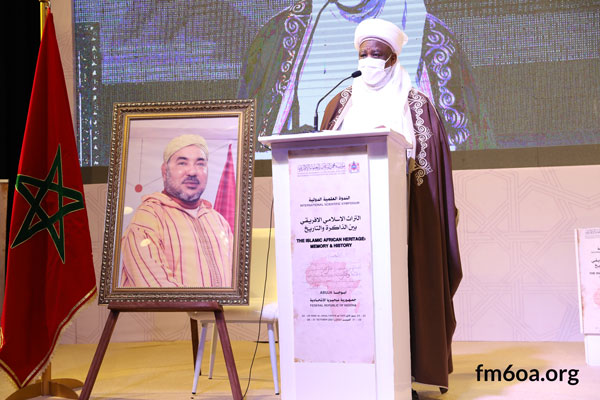SPEECH OF HIS EMINENCE THE SULTAN OF SOKOTO, ALHAJI (DR) MUHAMMAD SA’AD ABUBAKAIR, CFR, AT THE FORMAL OPENING OF THE INTERNATIONAL SYMPOSIUM ON AFRICAN ISLAMIC HERITAGE

SPEECH OF HIS EMINENCE THE SULTAN OF SOKOTO, ALHAJI (DR) MUHAMMAD SA’AD ABUBAKAIR, CFR, AT THE FORMAL OPENING OF THE INTERNATIONAL SYMPOSIUM ON AFRICAN ISLAMIC HERITAGE HOLDING AT TRANSCOPE HILTON, ABUJA ON FRIIDAY OCT 29, 2021
Let me first express our gratitude to the Almighty Allah, the Highest, for making it possible for us to hold this historic symposium in capital city of Abuja, Nigeria.
We must also thank the Muhammad VI Foundation for African Ulama for choosing to hold this symposium in Nigeria. lndeed, Nigeria has a lot that recommends it for this choice. lt has the largest population in Africa, over two hundred million for now; it also has the largest number of Muslims in any country in the continent, it hoIds one of the oldest Muslim Empires in Africa, the Borno Empire, it hosts a substantial part of the Sokoto Caliphate, which some scholars say is the most prolific scholarly movement which created a political change in Africa, which further occasioned the Caliphate of Hamdullahi of Ahmad Labbo in Masina and that of Shaykh Umar Al-Futi in Segu.
The lslamic heritage in Africa as scholars gathered here would know better, is very rich and deep. There is a huge collection of manuscripts in private collections as well as universities, public libraries and research centers. The three leading Sokoto Scholars alone have produced an astonishing total of about 300 works. This did not include the nearly 86 different works of Nana Asmau, the daughter of Shehu Usman Danfodio. Several Masters and Phd Theses have been undertaken across the world on these manuscripts and many monographs and books have been published. It may interest this august audience to know that the Sultan Foundation has been editing and translating many of these manuscripts into books in Hausa, English and their original Arabic.
This symposium is particularly important as it will broadened and sharpen the search for more manuscripts in Africa. This will help document and correct the European perspective of our history and help us appreciate our history and our contribution to humanity and therefore our worth. lndeed, history gives every society its worth, it tells us our roots, documents the achievements of our forefathers and set standards for us to maintain and improve upon and give us direction for our future.
This symposium will also help to inform the intellectual, social and even political discourses in Africa and clarify the cloud of ignorance that appear to obscure most discussions. Not many people today will appreciate that Islam had brought literacy to Africa one thousand years before European colonizers came to Africa. Not many would know that even when European explorers and missionaries came into Africa, they met a level of literacy not any lower than Europe and scholars that are more knowledgeable about their countries than themselves, as the encounter between Hugh Clapperton and Sultan Muhammad Bello, when he visited Sokoto in 1824, clearly indicated.
This symposium represents a milestone in our quest to discover our past, recover our worth and chart a course that is befitting of our legacy. Islam has been a blessing not only to Africa but also to Europe as some of the manuscripts will show. At a time where Africa needs fresh ideas for its rejuvenation, we need to look inwards, in the hidden treasures of wisdom of our past to get the impetus to chart a new course that will address and salve the many problems facing us today. I am confident that in this rich legacy of ours we shall find that which our grandfathers found which made them build the great empires of the past and contributed to humanity like all other civilizations.
Let’s once again thank King Mohammed VI himself, his foundation, and urge the organizers of this great event to give this effort maximum traction to deliver the huge expectations of Muslims in Africa. May Allah the Most High bless this effort to a great fruition in the near future. Amin.
Thank you for listening.
